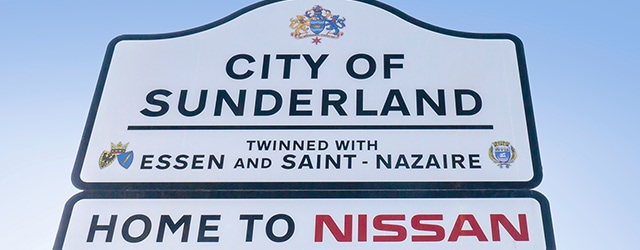Through two years of uncertainty, companies made plans to exit the UK. Now, many are actually leaving, and even Remain won’t bring them back.

When Japanese carmaker Nissan announced in February that it would abandon its plans to build a new version of the X-Trail sport utility vehicle at its plant in Sunderland, England, opponents of Brexit must have struggled to hide their schadenfreude. People living in Sunderland, like those throughout Northeastern England, had voted overwhelmingly to leave the EU. As a result, Nissan is now leaving England—taking as many as 400 jobs with it in the process.
This reversal came a mere two years after Nissan announced that its flagship car would be built in the UK, despite the Brexit vote—a choice based on post-referendum government assurances. Nissan was clear that Brexit had a role in its recent decision, saying that “continued uncertainty around the UK’s future relationship with the EU is not helping companies like ours to plan for the future.”
At the time of writing, the UK is barrelling toward March 29—the date at which the UK is scheduled to leave the EU under Article 50 of the Treaty on European Union. A no-deal Brexit is not guaranteed, but neither is an agreement. When this article goes to press, the UK will either have a deal to lead to a transitional period; an extension on Article 50; or it will have crashed out.
At this point, the outcome is almost immaterial, as many multinationals have already started preparations for departure. With no clear resolution in sight, some companies are activating contingency plans.
“To some extent, the damage has already been done, because people are delaying or not engaging in new investment,” says Jonathan Lewis, a partner with law firm Clifford Chance, which has been advising companies on Brexit. “This is especially so if companies have taken the conscious choice to relocate their headquarters to Europe or have started moving activities.”
Nissan is not the only Japanese carmaker that has seen the writing on the wall for UK operations. Last October, Toyota Motor Europe chief Johan van Zyl voiced concerns that a no-deal Brexit would negatively impact the company’s future investment decisions. Meanwhile, Honda UK has said it will shut down its factory in Swindon, England for six days in April as it prepares for Brexit-related disruptions.
It is not just carmakers. Japanese electronics giant Sony said in January that it will move its European headquarters from the UK to the Netherlands to avoid customs issues tied to Brexit. This news came within a week of appliance maker Dyson revealing that it will move its headquarters from Wiltshire, England to Singapore. The news was particularly stunning because Dyson’s founder, James Dyson, had been a vocal supporter of Brexit (although the company denied that Brexit played any role in the decision). The question is whether such moves are sufficient to insulate multinational businesses from the most severe impacts of Brexit.
There’s no going back, regardless of any extensions, delays, or even a second referendum. “While the Brexit vote has caused a prolonged period of unprecedented political uncertainty, further delays to the process are likely to bring yet more uncertainty, which will have a further negative impact on corporations,” says Piotr Korczak, associate professor at the University of Bristol, who recently co-authored a paper on Brexit’s impact on corporations. He believes the complexity of multinational operations means that companies only preparing just now will find there is little they can change in time. Many companies will already be at an advanced stage of costly preparations.
“The key focus now is to minimize disruption to supply chains and production in case of a no-deal Brexit,” says Korczak, who, like Clifford Chance’s Lewis, notes that Brexit uncertainty has already had a real impact. Firms—particularly large, complex multinationals with very long-term investment plans—have made strategic decisions on diverting investments in a way that is impacting their UK operations now.
“The most significant impact from a multinational’s perspective will be the geographic shift of operations and the lower importance of the UK in their structures,” he says. “[These changes] will not be reversed.”
Paola Conconi, a professor of economics at the Université Libre de Bruxelles and a member of the European Center for Advanced Research in Economics and Statistics, says the best-case scenario would have been for the UK to retain membership in the single market and customs union, which would let multinationals keep using the UK as an export platform to the rest of Europe.
“Even if there is a softer version of Brexit and the UK secures a free-trade agreement, it will still be less appealing as an export platform because of rules of origin,” she explains. “Very few people understand that if the UK wants a free trade agreement like Canada has with the EU, then it will have its own independent trade policy. But that will come at a big cost that comes with the potential for trade deflection.”
Conconi explains that only goods that comply with rules of origin are granted preferential tariff treatment. While satisfying origin criteria is straightforward for simple goods, it is much more complicated for products like automobiles, which are produced through international value chains with components from around the world. Adds Conconi: “This is key particularly for multinationals that have global supply chains, like Nissan and Honda…downstream multinationals that produce complex manufacturing.”
However, the University of Bristol’s Korczak adds that the UK’s future status as a gateway to Europe for multinational companies is a complex issue. Brexit is only one factor. “Indeed, the UK has been a gateway to Europe for companies like Japanese car manufacturers and US investment banks and Brexit has had a real impact on both,” he says. “While in some sectors the adjustment will be fairly rapid, in others it will be only gradual. A lot depends on post-Brexit trading relations between the UK and EU, but also on broader political and economic developments across the world.”



